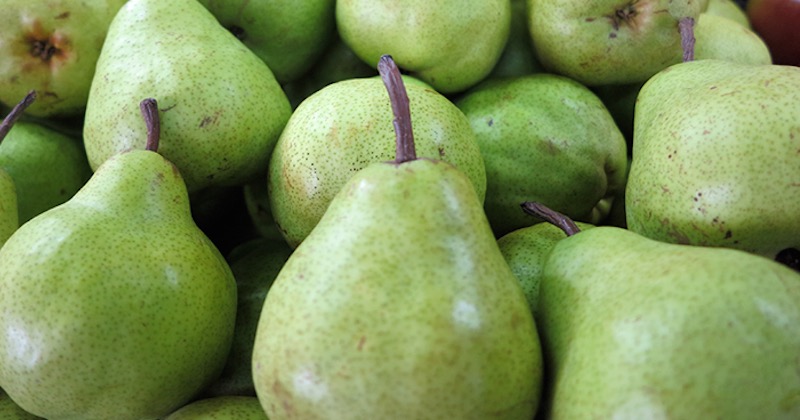Health Benefits of Pear: Why You Need Pears in Your Next Juice
Last updated on
Often overlooked as a common or boring fruit, there are many surprising health benefits of pear.
The pear is a sweet fruit that related to the apple (both are members of the pome family). They are about the size of an apple, also with several seeds in the core. Most pear varieties have paper-thin skins which are not easy to peel. The skins vary in color—yellow, green, brown, red, or a combination of any of these colors.
The light color flesh of pears is juicy, sweet and usually mild. Its texture is usually soft and buttery, though some varieties have grainy flesh.
We usually think of pear as bell-shaped, they can also be round.
Among all the variety of pears, the Chinese pear is known to have the most medicinal values. Nonetheless, the other varieties are also healthful in their own right.
Pears are in season during the summer months from mid June to September, depending on the variety and latitude at which they are grown.
Nutritional Benefits of Pear
Pears are an excellent source of water-soluble fiber. They contain vitamins A, B1, B2, C, E, folate and niacin.
They are rich in minerals such as copper, phosphorus and potassium; with lesser amounts of calcium, chlorine, iron, magnesium, sodium and sulfur.
Some variety have more iron content than others. This can be seen when a cut pear turns brown. If it doesn’t turn brown, it means that the iron content is very low or non-existent.
Health Benefits of Pear
Pears are often recommended as a hypo-allergenic fruit that is high in fiber but less likely to produce adverse reactions. Pear juice is healthy, mild and safe to be introduced to infants diet.
Here are some of the powerful health benefits of pear:
Blood pressure: Pears have anti-oxidant and anti-carcinogen glutathione which help prevent high blood pressure and stroke.
Cancer prevention: The high vitamin C and copper content mean that pears are good anti-oxidants, protecting cells from free radical damage.
Cholesterol: The high pectin content of pears make them ideal for lowering cholesterol levels.
Colon health: When not juicing, eat the pear whole for its precious fiber, ideal for a light colon cleanse.
Constipation: The pectin in pears is diuretic and give a mild laxative effect. Drinking pear juice regularly helps regulate bowel movement.
Energy: The high fructose and glucose content in pear juice make it a great natural source of almost instant energy.
Fever: The cooling effect of pear is great for relieving the symptoms of fever. A glass of pear juice is an excellent great way to bring down a fever quickly.

Immune booster: The anti-oxidants in pears are critical in building up your immune system. Drink pear juice when you feel a cold coming.
Inflammation: Pear juice has an anti-inflammatory effect and helps relieve pain.
Osteoporosis: Pears contain high level of boron. Boron helps the body to retain calcium, thus helps prevent osteoporosis.
Pregnancy: The high folate content prevents neural tube defects in infants.
Shortness of breath: The summer heat may cause children to have shortness of breath and excessive phlegm. Drink pear juice during this period to help clear the phlegm.
Throat problem: Pears are in season during the summer for a reason. Drinking pear juice every morning and night helps to cool your body down. It also nourishes the throat and helps prevent throat problems.
Vocal chord: Cube and boil two Chinese pears (picture above) with some raw honey and drink warm. This will soothe the throat and vocal cords.
Consumption Tips
To enjoy the health benefits of pear, here are my consumption tips:
- Choose firm, deep colored pears. Let them sit for a few days, if necessary, until they dent a little when pressed lightly, like an avocado does. To hasten the ripening process, simply put them in a paper bag and leave at room temperature.
- Once ripe, store in the refrigerator where they can remain fresh for a few days. Over-ripe pears are mushy and are not suitable for juicing. Always maintain the general rule of eating as fresh as possible.
- Store away from strong-smelling foods as they tend to absorb odors.
Reference:
https://www.ncbi.nlm.nih.gov/pmc/articles/PMC4657810/
Some of the links I post on this site are affiliate links. If you go through them to make a purchase, I will earn a small commission (at no additional cost to you). However, note that I’m recommending these products because of their quality and that I have good experience using them, not because of the commission to be made.


































 JOIN OVER
JOIN OVER